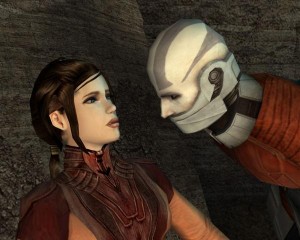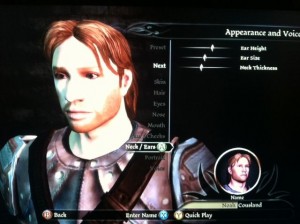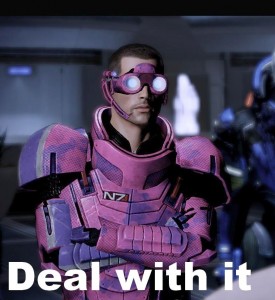 By Noah (follow on Twitter @RockstarNoah)
By Noah (follow on Twitter @RockstarNoah)
Picture by Brian Bear
For decades developers confined themselves to the idea that video games, like films and novels, could tell only a single story in a single way. But then morality became a consideration, and the basic construct of narrative was changed in a way that no other medium could accomplish.
By allowing players to have moral judgments in games, developers began changing the very structure of the narrative in video games.
More Children of Ideas and Comments after the jump…
With games like Fable and Knights of The Old Republic player actions didn’t just move the story to its conclusion, they began to craft it. The characters we played were flat and empty on their own, but held the potential to become almost whatever we wished them to be.
The basic rules of intelligible storytelling were mechanically preserved — enough fail-safes were in place to keep you from running off to be best friends with Darth Malak or help usher in our new Reaper overlords. But actual plot changes related to your decisions were rather tertiary. Good or bad, Commander Shepard was still going to kill Geth, recruit allies, get laid and fight the final boss.
KoTOR provided a few more overt changes between the good and bad storylines. You still recruited the same characters and fought the same villains, but when the time came to pick your side in the final battle, your companions wouldn’t always stick around. Choosing the Dark Side option to fight against the Republic in your final siege on the Star Forge was the first time your interests directly conflicted with your companions’. Choosing the Dark Side meant you were going to kill a few friends who had been by your side for the last thirty hours or so. Sure, they probably complained about some of your more unscrupulous actions, but they still fought and bled for you until that final Dark Side choice – and then you murdered them in an unflinching display [of what? Remorselessness?]. After that you joined up with Bastila while she bragged like a spoiled child with her father’s credit card about how great the Dark Side was. That was one of the moments that resonated with me – during the dénouement I felt miserable about what I’d done while some snobby bitch paraded her newfound amorality. In those moments I truly hated what I had become.

Bastila, one cut scene away from going Goth
That was a profoundly moving experience for me. However, the actual depth of the experience started and ended with me. My onscreen avatar didn’t seem at all bothered by the added weight on his soul – he just kept smiling and force-choking and doing whatever else I told him to do right up until the end. He got his revenge and all the accolades and power I felt he didn’t deserve. He didn’t seem to care, either. All the guilt and remorse accompanying the killing of my friends were my own entirely; my avatar chose not to share in them.
That’s when I realized he didn’t seem to enjoy his victories either. In any version of the story. No matter the input, my avatar never emotionally developed. Sure, I could make him say angry or intimidating or kind things when the situation gave me the opportunity, but that was only with my say-so. Revan, the Exile, Shepard, the Gray Warden and Champion Hawke, because of their role as the player’s avatar in a fluctuating, interactive environment based on their decisions, cannot be developed like characters in a traditional narrative sense. The player’s character is always in flux, bending to the whim of the person holding the controller.
But there’s a reason for this. In games like Mass Effect, KoTOR and Dragon Age your chosen character mirrors your choices, convictions and desires – the relationship between player and game becomes reciprocal rather than unilateral. That’s not just the Grey Warden, that’s me saving the day and getting all the best lines. However, the illusion is broken when Shepard exists outside of the character you create. The protagonists of these games cannot grow as human beings (or elves/dwarves) because the player would no longer be in control of how big of a badass his character is. If guilt or remorse or atonement existed for Commander Shepard, he wouldn’t be my Commander Shepard anymore. Any sort of emotional response or change in the character not only takes control of him out of our hands, but forces the player out of the experience.

I am Dragon Age
Thus, the responsibility of character development falls to the secondary characters in the story. While you are the galactic hero/badass shaping the boundaries of who you are and the technically limited reality around you, your companions are the ones forced to suffer it. While your own character is opaque and tangential, waiting to be filled with your own persona, the companion characters have more solidly grounded personalities. Garrus is the cop/vigilante frustrated by the leniency of “by the book” justice, Canderous likes to talk tough and crack skulls for cash. These are established characters fixed in their environments. And like their environments, they respond to your actions, for better or worse. They all have distinct morals, turn-ons, and lines they are unwilling to cross. As you change the world around them, their worlds change and they’re forced to react. They’re the ones that experience personal crises, exhibit joy and remorse towards your actions. While Shepard remains static, companions mirror the macroscopic events of the game that have unfolded with your influences and reflect them back in the microcosm of your ship or camp site.
Your decisions affect whether they like you or hate you, whether they achieve their goals, and in some cases, whether they live or die. On the most literal level, you are the cause and they are the effect. They develop and respond to what you do, and they expand to fill the void left by your inability to grow as a character in their environment. They are the digital spawn of your persona’s influence of that world, the children of ideas.

Face it, even if your cat is named "Tali," your favorite character is still Garrus
The companion characters serve as the emotional vehicle of the game and live as the most honest representations of personalities. And because they are molded from the bits of self you act out, by the end of the game they feel as much like old friends as they do facets of your unconscious self.
That’s what made the final decision in KoTOR so difficult to endure. I didn’t just click a few buttons to trigger programmed dialogue and combat sequence; I had just brought about the end of a horrible, dependent, masochistic relationship that was being strangled by resentment you can feel only towards someone you love. I didn’t just get yelled at by NPCs and respond by chopping them up – my companions were personalities I had a hand in creating. They tried so hard to convince me to be a tolerable human being and had so much faith in the concept that my decision broke them. Those little reflections of my soul pleaded with me, the avatar I had loosed upon them. They hated everything I had become and in that moment they abandoned their hope for me. And then I killed them.
Like I said: cathartic.
It felt like one of those uncomfortable truths about the world that you can only really grasp as an adult; right up there with “some day your parents are going to die.” No video game had ever done that to me before. In fact, I don’t think that emotional response could be triggered by any other storytelling medium. You may be able to empathize with characters in a book or TV show, but they’ll never show it back. The companion system in BioWare RPGs is one of the first storytelling mechanisms to build relationships for you out of what you put into it.
And that didn’t just make me care about the secondary characters in the game, it made me care about who I was in the game.

You actually did the dark side ending in KOTOR?
Yikes!
@Haroun – I played through the dark side ending of KOTOR. It was my third or fourth play-through, but I wanted to see how the story played out from that point of view. I will say it gets pretty twisted, but that is the dark side. I agree with Noah that it was hard to do it, in that your character shows no emotion. The only thing to give any feedback on your actions, beside cut-scenes, are your companions.
@Noah – Great article. The one thing in KOTOR that is different from other Bioware titles, is the persuade stat and even Force-persuade ability. This allows the player to manipulate some of your companions to go along with your ideas.